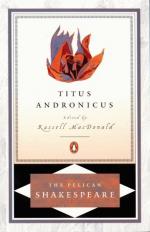|
This section contains 13,185 words (approx. 44 pages at 300 words per page) |

|
SOURCE: Moschovakis, Nicholas R. “‘Irreligious Piety’ and Christian History: Persecution as Pagan Anachronism in Titus Andronicus.” Shakespeare Quarterly 53, no. 4 (winter 2002): 460-86.
In the following essay, Moschovakis interprets Titus Andronicus as a potentially revolutionary critique of cultural violence sanctioned by religion.
For the violent spectacle of Titus Andronicus, Shakespeare drew much of his inspiration from Rome's lurid founding myths and from the legend of its imperial decadence.1 The annals of post-Reformation Christianity, however, afforded episodes of bloodshed and persecution that were more recent and closer to home. During the Armada year of 1588 alone, the English government executed more than thirty Catholics as traitors. Over the following six years, more than fifty were put to death.2 The number of Elizabethan Protestants dying for offenses related to their faith was comparatively small, yet their ranks were supplemented by vivid chronicles of persecution under previous Catholic regimes. Recently, critics have begun to...
|
This section contains 13,185 words (approx. 44 pages at 300 words per page) |

|


